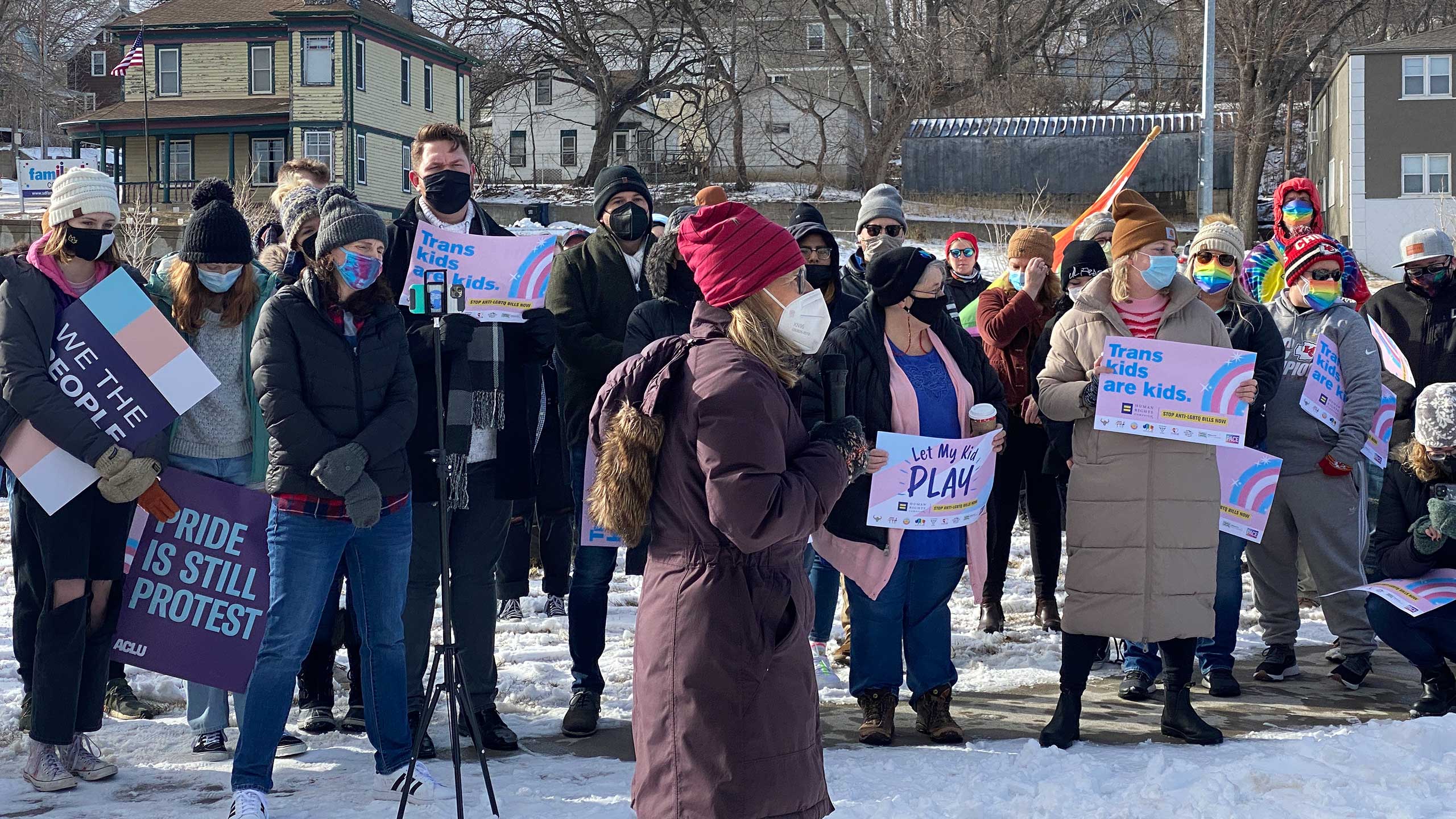For trans South Dakotans, the filing of anti-trans legislation this year wasn’t unexpected.
A. Bedient moved to South Dakota four years ago to practice family medicine and currently sits on the board of the advocacy organization Transformation Project South Dakota, which works to empower trans youth and their families. Every year that Bedient has lived in the state, the trans community has come under some sort of legislative threat. Last year, those threats included bills prohibiting name changes on birth certificates and banning trans girls from playing sports with cisgender girls, a new version of which is once again making its way through the state senate.
For some of Bedient’s young trans patients, the constant attacks are wearing them down. “A lot of younger people, especially teenagers, just turn it all off,” Bedient tells Xtra. “They can’t bear to listen to it, can’t bear to talk about it because it just makes them feel really, really targeted and vulnerable and like they’re being bullied by these adults.”
Just weeks into the new year, three transphobic bills are already making their way through South Dakota’s state legislature: one is an anti-trans bathroom bill, and the other two target trans student athletes. The Senate version of the anti-trans sports ban, Senate Bill 46, was approved by the Senate State Affairs Committee on Jan. 14 and will likely pass the full Senate on Tuesday. After that, it will be up for consideration in the House, where Republicans control 86 percent of seats.
SB 46 restricts participation in girls’ sports to those assigned female at birth. The legislation pertains to both K-12 and collegiate athletics and states that “only female athletes, based on their biological sex, may participate in any team, sport, or athletic event designated as being for females, women, or girls.”
In response, LGBTQ2S+ South Dakotans have organized protests in at least five cities across the state: activists in Sioux Falls; Vermillion; Rapid City and Brookings, South Dakota, all held rallies on Sunday, drawing hundreds of participants.
“We hope to have a day when South Dakota isn’t in headlines for these negative policies.”
At the Sioux Falls event, Adam Jorgensen, chair of the LGBTQ2s+ rights group Equality South Dakota, estimates 115 people came out and gathered in the snow to affirm trans kids’ rights to play sports on teams reflective of their gender identity. Protesters held signs reading “trans kids are kids” and “let my kid play,” marking the second year in a row that Equality South Dakota has organized protests defending the rights of trans kids.
“We are sick of this,” Jorgensen tells Xtra. “We hope to have a day when South Dakota isn’t in headlines for these negative policies.”
After the protest, a group of about 13 young people phonebanked and organized meetings between trans South Dakotans and members of the South Dakota legislature. According to Cody Ingle, a board member of Sioux Falls Pride, this type of outreach is critical to combat misinformation about trans girls’ “unfair advantages” in sports.
“One of the problems is that a lot of these people in the legislature—and this is no exaggeration—they’ve never met or interacted with somebody who’s trans,” Ingle tells Xtra. “They’re creating this legislation for people they’ve never even met.”
Another impetus for this weekend’s protests was a controversial advertisement released by South Dakota’s Republican governor, Kristi Noem, as part of her 2022 re-election bid. In the 30-second commercial, which appeared on primetime national television on Jan. 13, Noem gazes toward the horizon in a cowboy hat, while a voiceover proclaims that South Dakota has “the strongest law in the nation protecting female sports,” thanks to Noem’s leadership.
“In South Dakota, only girls play girls’ sports,” Noem said in an accompanying tweet.
Although Noem vetoed a bill restricting trans youth access to school sports last year over stylistic concerns, she has personally championed discrimination against trans athletes. Prior to the 2022 legislation, she pre-filed a draft bill in December taking aim at both trans boys and trans girls who wish to play sports. The proposed legislation would force all students to compete in alignment with the gender listed on official records “issued at or near the time of the athlete’s birth.”
The American Civil Liberties Union (ACLU) of South Dakota strongly condemned Noem in the wake of the ad’s release. Its advocacy manager, Jett Jonelis, says the governor is crusading to “solve a problem that does not exist” in order to boost her campaign.
“Transgender students participate in sports for the same reasons other young people do: to challenge themselves, to stay fit and healthy and to be a part of a team,” Jonelis says in a press release. “Trans students’ humanity, dignity, and ability to be full members of their school communities should never be up for debate like this.”
There is little conclusive science stating that trans athletes have a competitive advantage, and in South Dakota, there have been almost no documented cases of trans girls participating in sports at all.
Meanwhile, debates over who is enough of a “girl” to participate in girls’ sports can hurt cisgender student athletes, too. In states like Florida, anti-trans sports bans pushed by GOP lawmakers mandated genital checks on all student athletes in order to compete. Requiring athletes to prove their “femaleness” ignores the variety of biological and athletic characteristics that exists even among cisgender girls, according to Bedient.
“If it was so easy to go in and dominate as a trans girl, why do we not see trans girls winning everything?” Bedient asks. “If it was that easy, they would. But regardless of the lack of scientific bonafides behind the bill, it’s hurting trans kids in South Dakota now.”
Regardless of whether or not SB 46 becomes law, Bedient knows the damage has already been done. A large number of their patients, Bedient says, are just waiting until they can turn 18 and leave South Dakota altogether.
“Whether [SB 46] passes or not, this is harmful,” they assert. “These are kids, and they shouldn’t have to live feeling like a bunch of adults who are supposed to be taking care of them are coming after them year after year. They’re bringing these bills, it feels like, just to be spiteful. They don’t seem to care what the effect is on trans people, especially on teenagers.”


 Why you can trust Xtra
Why you can trust Xtra


